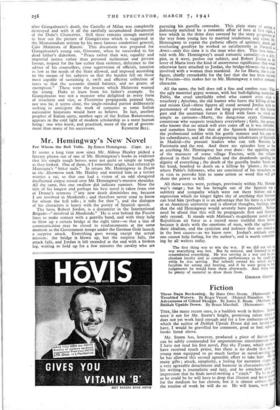Mr. Hemingway's New Novel
For Whom the Bell Tolls. By Ernest Hemingway. (Cape. 9s.)
IT seems a long time now since Mr. Aldous Huxley picked a literary phrase out of one of Mr. Hemingway's books as evidence that his simple tough heroes were not quite so simple or tough as they looked. One of them, if I remember aright, had referred to Mantegna's "bitter nails." In return Mr. Hemingway in Death In the Afternoon took Mr. Huxley and worried him as a terrier worries a rat, so that one had a vision of an odd elongated intellectual corpse tossed over Mr. Hemingway's massive shoulder. All the same, this one swallow did indicate summer. Now the title of his longest and perhaps his best novel is taken from one of Donne's sermons (" any new death diminishes me, because I am involved in Mankinde ; and therefore never send to know for whom the bell tolls ; it tolls for thee "), and the dialogue of his characters is heavy with the poetry of Spanish speech.
The hero, Robert Jordan, is a dynamiter in the International Brigade—" involved in Mankinde." He is sent behind the Fascist lines to make contact with a guerilla band, and with their help to blow up a certain bridge at the right time—so that a line of communication may be closed to reinforcements at the same moment as the Government troops under the German Golz launch a surprise attack. Everything goes wrong except the actual mission : the bridge is blown up, but the surprise fails, the attack fails, and Jordan is left stranded at the end with a broken leg, waiting to hold up for a few minutes the cavalry who are
pursuing his guerilla comrades. This plain story of aerie:41i dubiously enriched by a romantic affair of love at first sight; love which in the three days covered by the story Progresses d the way from young lust to married tenderness and allows Hemingway to repeat the pathetic effects of untimely death add everlasting goodbye he worked so satisfactorily in Farewell to Arms—only this time it is the man who dies. This love story-. told with Mr. Hemingway's usual romantic carnality—is a pity; plot, as it were, pushes out subject, and Robert Jordan as de lover of Maria loses the kind of anonymous significance that would otherwise have attached to Jordan, the bridge-blower—he is more involved with a woman than mankind. As for Maria, she is a lay figure, chiefly remarkable for the fact that she has been violated by Fascists—this makes her to Mr. Hemingway a rather roman* character.
All the same, the bell does toll a fine and sombre note: Pilar, the ugly maternal gypsy woman, with her bull-fighting memories; Pablo the cruel unreliable rebel who cannot even stick to treachery; Anselmo, the old hunter who hates the killing of men and misses God—these figures all stand around Jordan with the permanency of statues, and the long perspective of the hurried past and the uncertain future is filled with faces as vivid in simple as cartoons—Marty, the dangerous crazy Communist commissar who suspects treachery everywhere ; Golz, the general who knows that no attack will ever come off as it was intended; and nameless faces like that of the Spanish lieutenant-colond, the professional soldier with his gentle manner and his care for his subordinates, and all the disappointing inhabitants of Gaylord's in Madrid—the peasant leaders who can talk Russian, La Pasionaria and the rest. And there are episodes here as fine as anything Mr. Hemingway has ever done : the appalling story of the massacre of some village Fascists, with the villagen dressed in their Sunday clothes and the drunkards spoiling the dignity of everything ; the death of the guerilla leader Sordo and his band, bombed to death on a hilltop by 'planes ; the scene where Pablo's followers, who are convinced of his treachery, try in vain to provoke him to some action or word that will give them the power to kill.
All these scenes were, perhaps, previously within Mr. Hem* way's range' but he has brought out of the Spanish war I subtlety and sympathy which were not there before and an expression which no longer fights shy of anything that literature can lend him (perhaps it is an advantage that his hero is a lecturer at an American university and is allowed thoughts, feelings, ideas that the old Hemingway would severely have pruned). Nobody need be afraid that this will be propaganda first and literature only second. It stands with Malraux's magnificent novel of the Republican air force as a record more truthful than history, because it deals with the emotions of men, with the ugliness el their idealism, and the cynicism and jealousy that are mixed uy in the best causes—as we know now. Jordan's attitude stand.S one cannot help feeling, for the author's, and is worth remember. ing by all writers today.
The first thing was to win the war. If we did not win dr war everything was lost. But he noticed, and listened to, in remembered everything. He was serving in a war and he gat absolute loyalty and as complete performance as he could tat while he was serving. But nobody owned his mind, nor hi faculties for seeing and hearing, and if he were going to foci judgements he would form them afterwards. And there wail be plenty of material to draw them from.
GRAHAM GREENE






























 Previous page
Previous page